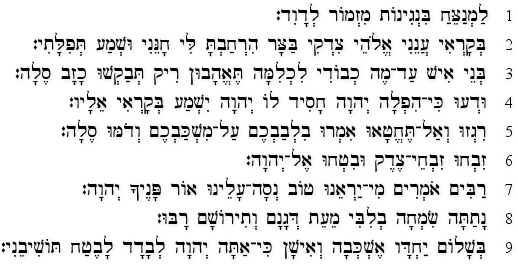|
|
|||||||||||||||||||||
 |
|||||||||||||||||||||
 |
|||||||||||||||||||||
|
|
||||||||||||||||||||||||||||||||
 |
|
Psalm 4 (KJV) |
|
Note: In English translations, v1 and v2 are combined; in the Hebrew Bible, v1 stands alone. |
|
|
||||||||||||||||||||||||||||||
|
v1 Notes: |
|
In Jewish tradition, David composed this psalm as he fled from Absalom, but in this psalm (unlike Psalm 3), David addresses his enemies directly and admonishes them to turn from their evil ways to the LORD. |
|
bekori aneini Elohei Tziddki batzar hirchavta li choneini u'shema tefillati |
||||||||
|
Hear me when I call, O God of my righteousness: thou hast enlarged me when I was in distress; have mercy upon me, and hear my prayer. |
||||||||
|
v2 Notes: |
||||||||
|
bikori aneini Elohei tzaddiki - "When I call, answer me, God of my righteousness." The appeal to God as God of my righteousness means that David is assured that the LORD understood his afflication and persecution. |
|
b'nei ish ad-mah khevodi likhlimah te'ehavun rik tevakshu khazav. Selah. |
||||||||
|
O ye sons of men, how long will ye turn my glory into shame? how long will ye love vanity, and seek after leasing? Selah. |
||||||||
|
v3 Notes: |
||||||||
|
b'nei ish - "sons of men." Some Jewish commentators note there is a distinction between ish and adam. According to Radak, ish refers to superior men, men of distinction, rather than the more ordinary men denoted by the word adam. Since these "sons of men" honor their own fathers, why do they help Absalom disrespect his own father? |
|
u'de'u ki-hiflah Adonai chasid lo, Adonai yishma b'kori elav |
||||||||||
|
But know that the LORD hath set apart him that is godly for himself: |
||||||||||
|
v4 Notes: |
||||||||||
|
u'de'u ki-hiflah Adonai chasid lo - "But recognize that the LORD singles out the godly one for Himself." This imperative sentence is meant to inform David's enemies that their conspiracy against him is therefore rebellion against the LORD Himself. David was assured that God set him apart and called him chasid (from chesed) by installing him as king over Israel. |
|
rigzu v'al-techeta'u imru vilvavkhem al-mishkavkhem v'domu. Selah. |
||||||||||
|
Stand in awe, and sin not: commune with your own heart upon your bed, and be still. Selah. |
||||||||||
|
v5 Notes: |
||||||||||
|
rigzu v'al-techeta'u - "Tremble and sin not." Ragaz means to "quake" or "tremble," so the KJV (and other translations) seem to miss it with "stand in awe" or "be angry." The fear of the LORD (yirat Adonai) induces reverence and awe, which should be prevalent in the heart of those who call themselves Jews. The prospect of sin should cause us to tremble, and the bitterness of past failures should cause us to be shaken. The sin of which David refers is from v1, seeking falsehood. The rabbis use this phrase to argue that we should "agitate" our yetzer tov (good inclination) in opposition to the yetzer hara (evil inclination). |
|
zivchu zivchei-tzedek u'vitchu el-Adonai |
||||||||||
|
Offer the sacrifices of righteousness, and put your trust in the LORD. |
||||||||||
|
v6 Notes: |
||||||||||
|
zivchu zivchei-tzedek - "Offer sacrifices of righteousness." The word tzedek does not denote "charity" or merely good deeds, but justice or acting according to the truth of the moral imperative: tzedek, tzedek tirdof ("Justice, justice shall you pursue," Deut. 16:20). |
|
rabim om'rim mi-yareinu tov nesah-aleinu or panekha Adonai |
||||||||||
|
There be many that say, Who will shew us any good? |
||||||||||
|
v7 Notes: |
||||||||||
|
rabim om'rim mi-yareinu tov - "Many say, 'Who shall show us any good?'" The sages attribute this statement to followers of Absalom who were disgruntled at David's leadership. |
|
natatah simchah v'libi me'et deganam v'tirosham rabu |
||||||||||
|
Thou hast put gladness in my heart, more than in the time that their corn and their wine increased. |
||||||||||
|
v8 Notes: |
||||||||||
|
natatah simchah v'libi - "But You have put joy in my heart." David finds contentment and even joy, despite his circumstances. He harbors no jealously or hatred for his enemies, but instead finds the Source of his joy in the LORD. |
|
b'shalom yachdav eschkevah v'ishan, ki-atah Adonai l'vadad lavetach toshiveni |
|||||||||
|
I will both lay me down in peace, and sleep: for thou, LORD, only makest me dwell in safety. |
|||||||||
|
v9 Notes: |
|||||||||
|
b'shalom yachdav eschkevah v'ishan - "In peace together I lay down and sleep." Consistent with the words of the prophets, David concludes his song with an appeal for unity and peace to Israel. It is David's solemn desire to see all his fellow Jews embrace the LORD and walk in the light of His countenance. Only in this way will lasting shalom be established. |
|
|
|
||||||||||||||||||||||||||||
|
Hebrew for Christians |
|||||
|
|||||
